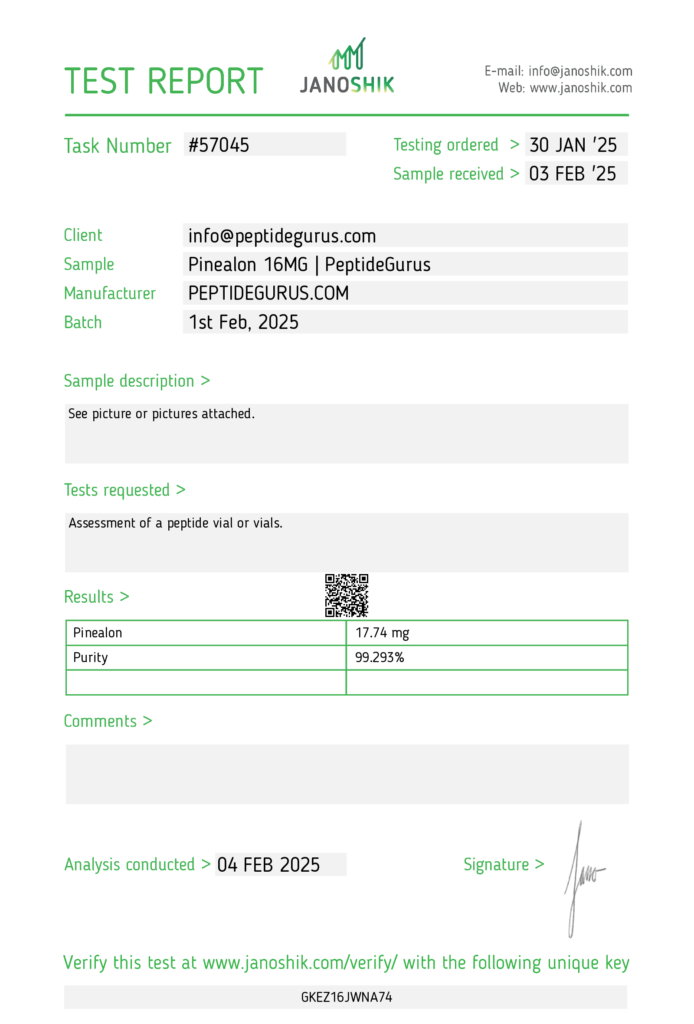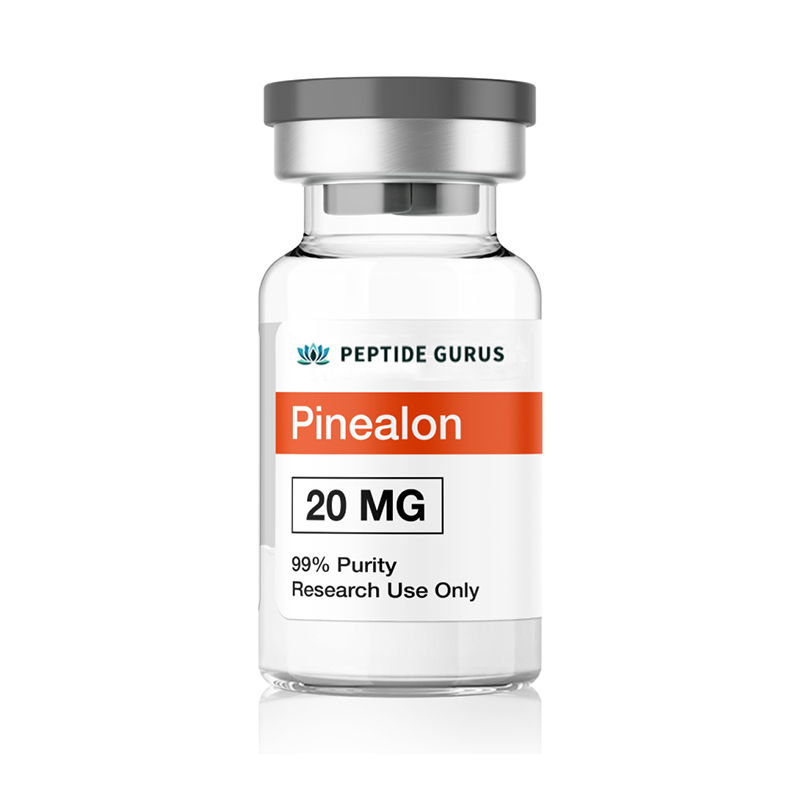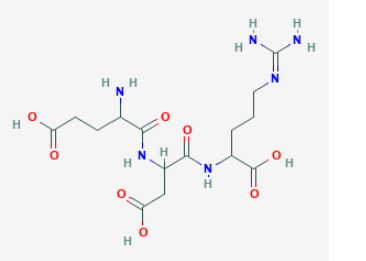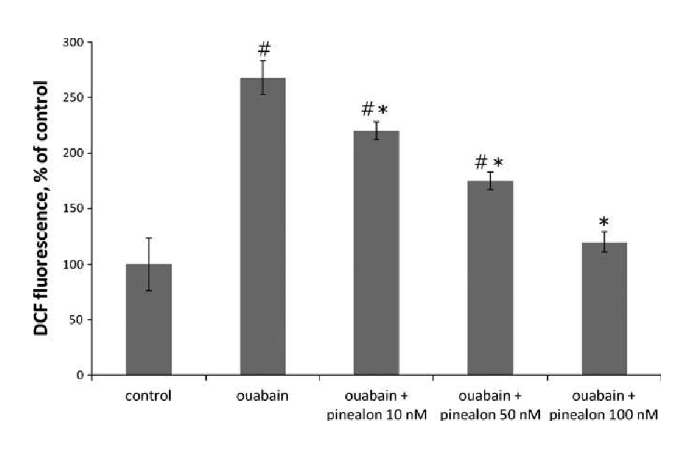




カテゴリ:ペプチド生物調節器
遊離(1)30 mlの細菌性水
資格のある注文があります500米ドル.
(カプセル製品、化粧品ペプチド、プロモーションコード、出荷を除く)
ピナロンは、長さがわずか3つのアミノ酸の合成ペプチドです。挙動を修正し、低酸素症の影響から多くの細胞タイプを保護することが示されています。概日リズムを変え、記憶を改善し、学習を強化する能力について、広範な研究を受けています。特に中枢神経系での老化の影響を相殺することが示されており、アルツハイマー病のような認知障害の治療に役立つ可能性があります。
製品の使用:この製品は、研究化学物質としてのみ意図されています。この指定により、in vitroテストと実験室の実験のために、研究化学物質を厳密に使用することができます。このウェブサイトで利用可能なすべての製品情報は、教育目的のみを目的としています。あらゆる種類の人間や動物への身体導入は、法律によって厳密に禁じられています。この製品は、認可された資格のある専門家によってのみ処理される必要があります。この製品は薬物、食品、または化粧品ではなく、薬物、食品、化粧品として誤ってブランド化されたり、誤用されたり、誤ったりしたりすることはない場合があります。
ピナロンは、わずか3つのアミノ酸で構成される短いペプチドです。これは、遺伝子発現レベルを変化させるためにDNAと直接相互作用する能力のために、ペプチドバイオレギュレーターと呼ばれる一握りの合成ペプチドの1つです。ピナロンは行動の修正に関連しており、低酸素症の影響に対してニューロンを含む多くの細胞タイプを保護するのに役立つと考えられています。松果体への直接的な影響により、松果体は薬物代謝、概日リズム障害、記憶、学習などの問題を軽減する可能性があります。

順序:glu-asp-arg
分子式:c15h26n6o8
分子量:418.407 g/mol
Pubchem cid: 18220191
同義語:グルタミルアスパルタルアルギン、T-33ペプチド
ほとんどのペプチドとは異なり、ピナロンは細胞表面または細胞質受容体に結合していないようです。これにより、科学者は、短いペプチドがどのように効果があるかを疑問に思うようになりました。過去には、ピネアロンは脂質二重層を通過するのに十分なほど小さい可能性があることが示唆されていました(たとえば、細胞膜、核膜)、したがってDNAと直接相互作用できる可能性があります。細胞培養(HELA細胞)の検査は、ピナロンが細胞膜と核膜に直接浸透し、DNAと相互作用することを示しています。[1]. This makes pinealon a regulator of gene expression and explains the peptide’s myriad effects that cannot be explained by receptor interactions.
Pinealon may have anti-aging effects in the central nervous system. Research from Russia indicates that pinealon and a similar peptide, vesugen, are anabolic in the brain and can actually slow the rate of aging when calculated using biological age indicators[2].
Pinealon is active in cells outside of the central nervous system as well. Research shows that the peptide also has effects on muscle cells where it alters the expression of irisin[3]. Irisin is important to protecting muscle cells during exercise, promotes fat burning, and is thought to induce telomere elongation as well. By increasing the lifespan of irisin, pinealon boosts telomere protection and helps to fight off the effects of aging and oxidative stress. In fact, plasma irisin levels are directly linked to telomere length in healthy adults and levels of the enzyme have been directly linked to calorie restriction, one of the few activities known beyond doubt to prolong life and improve overall fitness[4]. Interestingly, there is evidence that irisin is active outside of muscle cells and that pinealon may therefore have anti-aging effects that are broadly distributed throughout the body, including the brain.
Research in prenatal rats indicates that pinealon protects neurons against oxidative stress and thus protects cognitive function and motor coordination[5]. The study showed marked decreases in both reactive oxygen species accumulation as well as number of necrotic cells in the brain in these rats. In other words, pinealon protects neurons from dying.
The findings of the prental rat study discussed above have been confirmed in separate studies and extended in others. Confirmation that pinealon protects against reactive oxygen species and reduces necrotic cell death also came with the understanding that the peptide modifies the cell cycle as part of its protection against cell death[6]. This was one of the first indications that pinealon was almost certainly interacting at the level of DNA. Interestingly, pinealon modulates the cell cycle by activating proliferation pathways. Under normal circumstances, this would lead to an increase in cell number, but under the setting of oxidative stress, this effect simply offsets some of the damaging effects of reactive oxygen species.

Research in adult rats deprived of oxygen has also shown that pinealon increases the resistance of neurons to hypoxic stress. It appears to do this by stimulating innate anti-oxidative enzyme systems and limiting the excitotoxic effects of N-methyl-D-aspartate[7]. N-methyl-D-aspartate (NMDA) is an amino acid derivative that can kill nerve cells by over-exciting them. NMDA has been shown to become overactive during withdrawal from alcohol and is at least partly responsible for the “shakes” or delirium tremors that affects chronic alcoholics during withdrawal. NMDA has been linked to nerve death in traumatic brain injury and ischemic stroke.
Irisin, which has been discussed in the context of muscle cell protection, has recently been found in the brain where it plays important roles in neural differentiation, proliferation, and energy expenditure. Irisin levels in the central nervous system has been found to stimulate genes in the hippocampus that are important to memory, learning, the overall neuron health[8]. Research in rats suggests that exercise directly boosts levels of irisin in the brain, which may finally provide the link between physical activity and cognition. Scientists have speculated that irisin is the messenger that mediates crosstalk between skeletal muscle and the central nervous system during exercise. Pinealon boosts levels of irisin by altering expression of the gene that codes for the enzyme. This leads to increased levels of irisin through prolonged lifespan of the enzyme.
Research in cultures of brain cortex cells indicate that pinealon can boost expression of 5-tryptophan hydroxylase via epigenetic changes. 5-tryptophan hydroxylase is critical to the production and secretion of serotonin, a peptide known to have neuroprotective and geroprotective features[9]. It is also the signaling molecule most often targeted by anti-depressive drugs called selective-serotonin reuptake inhibitors (SSRIs). SSRIs have a number of side effects, however, and the ability to boost serotonin production organically could offer a means of fighting depression that is more physiologic and thus reduce side effects.
The initial understanding that pinealon could affect the cell cycle came from research into the effects of the peptide in rat models of ischemic stroke. These studies revealed that pinealon affects cytokine signaling that normally leads to an increase in levels of the caspase-3 enzyme[10]. Caspase-3 is directly responsible for initiating apoptosis, or the controlled death of a cell via genetic instruction. By modulating caspase-3, pinealon shuts down at least one pathway to cell death and thus reduces the effects of oxygen deprivation during stroke.
Caspase-3 is not only active in neurologic tissue though, it is almost universal. Research using models of heart attack indicates that pinealon may reduce caspase-3 levels following myocardial infarction[11]. The short peptide may have application both in treating heart attack and in preventing the long-term remodeling that causes so much dysfunction following a myocardial infarction.
The benefit of pinealon in suppressing caspase-3 expression has been demonstrated in skin cells. By reducing apoptosis in the skin, pinealon promotes cell proliferation in both young and old animals alike. This leads to an increase in the regenerative process and has been shown to offset age-related pathology in the skin[12]. Pinealon may eventually form part of a multi-faceted approach to wound healing and could have application in everything from sun protection to serious burn treatment.
It should come as no surprise, given its names, that pinealon affects that sleep-wake cycle as well as sleep behavior. Research indicates, that pinealon may help to regulate the dysfunction caused by shift-work and other activities (e.g. long-distance travel) that interfere with normal sleep patterns. The peptide actually appears to reset the pineal gland to baseline in the setting of circadian rhythm disruption, improving sleep, depression, mood, blood pressure, and more as a result[13].
The ability to regulate sleep actually corresponds strongly with rates of aging. Disturbed sleep is a recipe for disaster in the body and affects cognition, cardiac health, wound healing, mood, and more. Pinealon may therefore help to reduce the impact of sleep disturbance and thus offset the effects that it has on aging. This could be beneficial not only to those forced into disorder sleep due to their jobs, but to individuals suffering from organic disease that impacts sleep-wake cycles.
Pinealon exhibits minimal side effects, low oral and excellent subcutaneous bioavailability in mice. Per kg dosage in mice does not scale to humans. Pinealon for sale at
The above literature was researched, edited and organized by Dr. Logan, M.D. Dr. Logan holds a doctorate degree from Case Western Reserve University School of Medicine and a B.S. in molecular biology.

Vladimir Khavinson is a Professor, President of the European region of the International Association of Gerontology and Geriatrics; Member of the Russian and Ukrainian Academies of Medical Sciences; Main gerontologist of the Health Committee of the Government of Saint Petersburg, Russia; Director of the Saint Petersburg Institute of Bioregulation and Gerontology; Vice-president of Gerontological Society of the Russian Academy of Sciences; Head of the Chair of Gerontology and Geriatrics of the North-Western State Medical University, St-Petersburg; Colonel of medical service (USSR, Russia), retired. Vladimir Khavinson is known for the discovery, experimental and clinical studies of new classes of peptide bioregulators as well as for the development of bioregulating peptide therapy. He is engaged in studying of the role of peptides in regulation of the mechanisms of ageing. His main field of actions is design, pre-clinical and clinical studies of new peptide geroprotectors. A 40-year-long investigation resulted in a multitude of methods of application of peptide bioregulators to slow down the process of aging and increase human life span. Six peptide-based pharmaceuticals and 64 peptide food supplements have been introduced into clinical practice by V. Khavinson. He is an author of 196 patents (Russian and international) as well as of 775 scientific publications. His major achievements are presented in two books: “Peptides and Ageing” (NEL, 2002) and “Gerontological aspects of genome peptide regulation” (Karger AG, 2005). Vladimir Khavinson introduced scientific specialty “Gerontology and Geriatrics” in the Russian Federation on the governmental level. Academic Council headed by V. Khavinson has oversighted over 200 Ph.D. and Doctorate theses from many different countries.
Prof. Vladimir Khavinson is being referenced as one of the leading scientists involved in the research and development of Pinealon. In no way is this doctor/scientist endorsing or advocating the purchase, sale, or use of this product for any reason. There is no affiliation or relationship, implied or otherwise, between
The products offered on this website are furnished for in-vitro studies only. In-vitro studies (Latin: in glass) are performed outside of the body. These products are not medicines or drugs and have not been approved by the FDA to prevent, treat or cure any medical condition, ailment or disease. Bodily introduction of any kind into humans or animals is strictly forbidden by law.
PeptideGurus is a leading supplier of American-made research peptides, offering top-quality products at competitive prices. With a focus on excellence and customer service, they ensure a secure and convenient ordering process with global shipping.
CONTACT